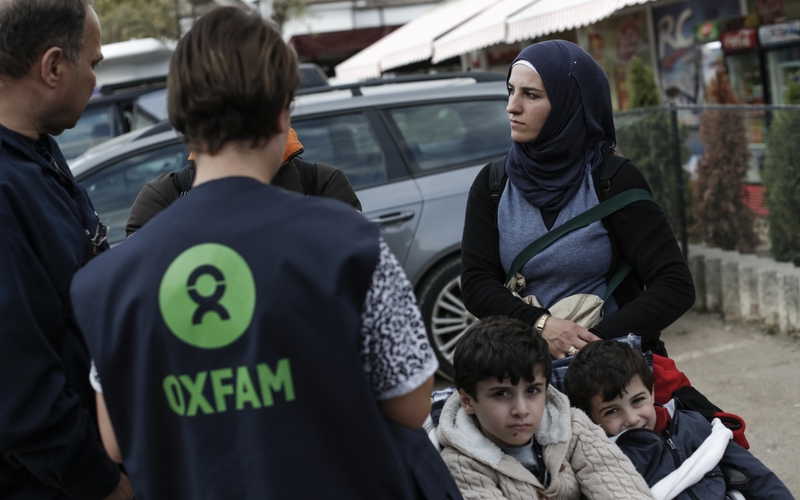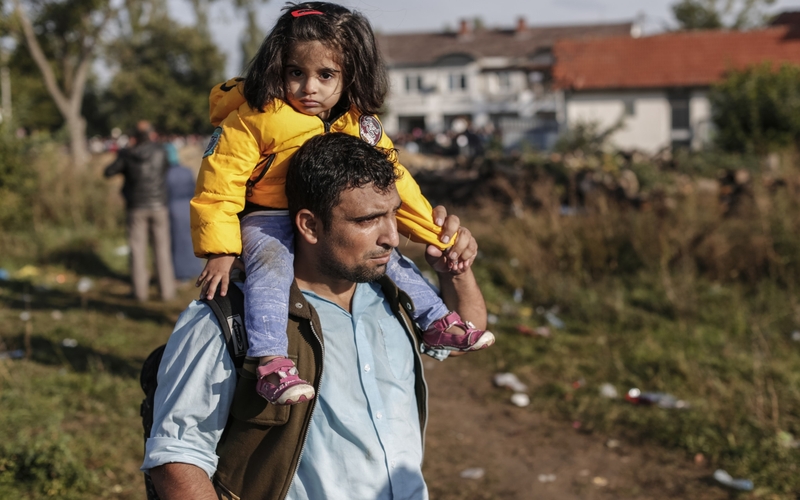As more Syrian families make their way into Europe, Oxfam is setting up a new program in Serbia to help them cope with the approaching winter.
A small collection of children are sitting on a littered street outside a refugee registration center in Presevo, Serbia, when a photographer snaps their picture. Consumed with their own thoughts, they don’t look up: He is just another stranger in a stream of many they have passed on their long journey to safety.
They are from Aleppo, the largest city in war-torn city Syria where nearly five years of bloodshed has displaced more than half of the nation’s 22 million residents. More than four million of them have made their way across the border to seek safety in Jordan, Lebanon, Turkey, Iraq and Egypt —and now increasingly further afield, leaving European governments scrambling to address the needs of the new arrivals.
Like the young family perched on the street in Presevo, countless others from Syria have decided to make the often dangerous trek after concluding they have no other option.
“You can get used to war, but when you lose your hope you have to leave,” says the children’s father, Khaled. “It’s not important if you have fear in your heart. When you lose hope, you lose everything.”
On their journey from Syria, Khaled and his children slept in the forest for a night and later jammed themselves into the back of a van packed with 42 adults and seven kids. They eventually joined thousands of other people outside the registration center situated at the southern tip of Serbia, just over the border from Macedonia. Some, like Ahmad and his young daughter, Nour, came on foot, having walked 20 kilometers that day. Others had been waiting days to get a 72-hour permit to travel through the country to Croatia.
Mariam Bazr Bashi, a 29-year-old mother from Damascus, had spent seven days traveling from Turkey through Macedonia, carrying her seven-year-old son most of the way: He has muscular dystrophy and is unable to walk. It wasn’t until she reached Serbia that someone gave her a wheelchair for the boy. Together with a second son, Bashi is determined to get them all to Germany where she is hoping to find medical treatment for the older child. Her husband is still in Syria.

What is Oxfam doing?
With winter approaching, Oxfam is now launching a new program in Serbia to help many of the refugees as they make their way through the country. Along with Presevo, we’ll be focusing our efforts in Sid, which is near the border with Croatia, and in Dimitrovgrad near Bulgaria.
“People are arriving here exhausted, hungry, and thirsty, and often in need of urgent medical attention,” says Riccardo Sansone, Oxfam’s humanitarian coordinator in Serbia. “They are traumatized and have often been abused by the smugglers and human trafficking networks. Water and sanitation facilities are insufficient along the whole migration route because Serbia was not expecting such numbers.”

“Families with small children are sleeping in the open air in parks, bus stations, and in the bush at crossing points,” says Sansone. “They are highly exposed to the risk of robbery, sexual violence, and other abuses.”
Oxfam has been working in the western Balkan countries since the 1990s on both long-term development projects and emergencies. In 2014, together with our partners, we responded to floods that affected north-western Serbia as well as other parts of the Balkans.
In Jordan and Lebanon we are helping refugees with clean drinking water or cash and relief supplies. In both countries we have built blocks of bathing stalls and toilets for families living in camps and informal settlements. And in Syria, in partnership with the government’s Ministry of Water Resources and other aid groups, we are helping to provide many families with clean water. All told in the three countries, we have reached more than 1.6 million people
Families face a difficult future
But the challenges facing displaced families are acute—especially as appeals for humanitarian aid are falling far short of the $8.9 billion that’s needed. To date, wealthy countries have committed to funding just 44 percent of the need. The World Food Programme says that food assistance will have to be cut by up to 40 percent in October and 60 percent in November.

Their despair is deep, and Khaled, the father of the children outside the registration center in Presevo, probably speaks for many.
“Syrians are bleeding,” he says. “They’re dying. We pray to God that you can do something to help for our human rights.”
Please donate to the Syrian Refugee Crisis Fund to help us meet the most critical needs in this escalating emergency. Donate now
